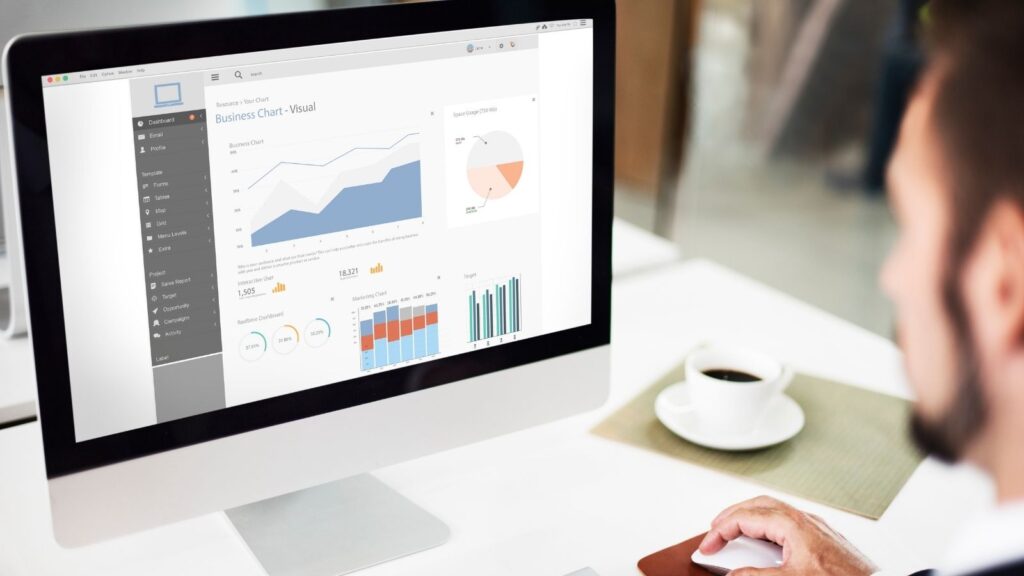Quickbooks small business accounting software is an accounting software program that helps small business owners process invoices, track expenses and payments, reconcile bank accounts, prepare year-end reports, produce financial statements, and more. Quicken is another popular choice for small businesses with basic needs. However, if you’re looking for something to help manage your inventory or even outsource help like payroll processing, then Intuit’s other flagship product (Sage) might be a better choice.
It is a strong alternative for a wide variety of businesses, particularly those that plan to interact with a bookkeeper or accountant on a regular basis. QuickBooks Online’s four subscriptions and a variety of add-on services provide a high level of capability, flexibility, and scalability – you can tailor this software to your business’s specific needs. Although QuickBooks small business accounting software is intuitive, there is a learning curve, particularly if you are inexperienced with basic accounting principles. Additionally, it is the best free accounting software for small business.

QuickBooks (Online Accounting Software For Small Business): How Does It Work?
After creating an account with QuickBooks (Online accounting software for small business), you’ll be able to log in and access the primary dashboard page. If you’re switching from another accounting program to QuickBooks, you can import your current files. The primary dashboard provides an overview of your QuickBooks account, including information about your cash flow, invoices, expenses, and sales. Connect your bank and credit card accounts to QuickBooks via the Banking (or Transactions) tab on the left side of the dashboard. QuickBooks will automatically download and categorize transactions for you. Later on, after reconciling your books, you’ll be able to evaluate these transactions through the Banking menu’s For Review tab.
Following that, you may personalize invoices, configure automated sales tax monitoring (if applicable), and learn how to enter mobile receipts and bills. The gear icon in the upper right corner allows you to adjust all of your business’s account settings. You can invite your bookkeeper or accountant to your QuickBooks Online account via the My Experts option — or you can search for an accountant if you don’t currently have one.
How much does QuickBooks small business accounting software costs?
QuickBooks small business pricing is a monthly, quarterly, or yearly fee depending on the plan you select for your business.
- Monthly Plans: QuickBooks Small Business Accounting Software Online Plan $14.95 per month per user – Unlimited Users| Company Central Plan| Enterprise| Premier| Ultimate
- Quarterly Plans: QuickBooks Small Business Accounting Software Basic Plan- $49/month per user |Basic Reporting Services
- Yearly Plans: Basic Plus Plan -$59/month per user |Plus Quarterly Reports Services |Data Extractions Services
- Enterprise Plus Plan- $109/month per user
Is QuickBooks Small Business Accounting Software hard to learn?
QuickBooks is a straightforward accounting software to learn. The company has made the program extremely user-friendly, and they have step-by-step tutorials to help with complicated tasks. There are also customer support representatives available at any hour of the day to answer questions or provide additional assistance when needed.
Does QuickBooks Small Business Accounting Software report to IRS?
QuickBooks Small Business Accounting Software is a program that helps you track your expenses for the IRS, but it does not report to them. There are other accountancy programs like TurboTax, Tax Record Keeper, and NUANCE if you’re looking for an outlet straight from the IRS.
How safe is Online QuickBooks Small Business Accounting Software?
QuickBooks Small Business Accounting Software online services include data backup, encryption, firewalls, anti-malware software, and other similar safeguards to ensure that your data remains private and secure at all times.
Do professional accountants use QuickBooks Small Business Accounting Software?
Professional accountants use QuickBooks Small Business Accounting Software because it is the most widely used and affordable accounting software in the United States. Accounting firms, in particular, will often already have a subscription to it so they can process financial data for their clients more efficiently.
Should I buy QuickBooks Small Business Accounting Software for my business?
QuickBooks small business accounting software is highly recommended for small businesses. It allows you to track assets and monitor your cash flow, expenses, and more. QuickBooks small business accounting software is the number one desktop accounting program used by small businesses to manage financial data, inventory tracking and provide visibility into their company’s performance. With a full suite of products designed to meet the needs of nonprofits, municipalities specifically, and other government entities plus personal finance software such as TurboTax, QuickBooks small business accounting software makes managing finances both accessible and understandable so everyone can be on the same page even if they have different areas of expertise or responsibilities.
What Are The Advantages of QuickBooks Small Business Accounting Software?
Extensive feature set
QuickBooks Online is the industry standard for small business accounting software for a reason. Maintaining records and reporting: QuickBooks Online makes it simple to maintain full, precise records. When adding an expense, you can include reference numbers, permission numbers, attachments, and memoranda. Additionally, you can divide the expense into various categories or products. While it is not necessary to complete every field in an expense or income entry, the more detailed your records are, the more useful some reports become. For example, QuickBooks Online Plus and Advanced allow you to track inventories and perform task costing — that is, determine the cost of completing a particular project. Even without those higher-level plans, you can build custom tags and run reports to track your revenue and expenses. These capabilities can aid in the organization of your finances and provide insights into cost-cutting opportunities or sales patterns that can be used to develop and grow your business. Inventory management: QuickBooks Online Plus and Advanced enable you to keep track of your inventory and cost of items, as well as set up low stock notifications. Additionally, you may manage purchase orders, vendors, and inventory sync with third-party platforms like as Amazon and Shopify.
While some competitors, such as Xero, contain comparable inventory management options, others, such as FreshBooks and Wave, offer extremely limited inventory monitoring capabilities.
Numerous application integrations
QuickBooks Online provides access to a robust marketplace of over 600 apps – both third-party utilities and QuickBooks add-ons. Of course, you are not required to use these apps to get the most benefit from this accounting software; but, they can provide additional features and help you reduce duplication of work across platforms.
For example, with QuickBooks Time (previously TSheets), you can manage employee time from within QuickBooks and approve timesheets for payroll, job costing, billing, and invoicing. Other apps can assist you with tax preparation, business financing, payroll management, client account management, and the generation of various financial reports and insights. Certain apps (like QuickBooks Time) have a fee, while others are completely free.
What Are The Disadvantages of QuickBooks Online?
Monthly plans can be quite costly
QuickBooks Online Simple Start is $25 per month for a single user and excludes time tracking, bill pay, and inventory management. Multiple users, time tracking, and bill pay require an upgrade to Essentials ($50 per month), while inventory management requires an upgrade to Plus ($80 per month). Competitors may offer identical programmes at a lower monthly rate. For instance, Xero’s monthly pricing ranges from $11 to $62 and all options include unlimited users, bill pay, and inventory management.
Curve of learning
QuickBooks Online is most intuitive to use if you have a basic understanding of accounting concepts. While you may be able to utilize certain software alternatives without explanation, getting the hang of QuickBooks may take some time. However, you will get the most out of this strong system if you comprehend its full potential. Tutorials, help sites, and talking with experts are all excellent ways to learn how to use QuickBooks Online for your business.
What Are The Additional QuickBooks options?
QuickBooks Payroll
Managing a rapidly expanding team? QuickBooks Payroll can be added to an existing QuickBooks Online plan. Pricing begins at $45 per month, with an additional $4 per month for each paid employee. QuickBooks includes full-service payroll with all of its payroll plans, which means QuickBooks calculates and files payroll taxes for you. QuickBooks Payroll is one of our favourite payroll providers; if you’re already using QuickBooks and have recently hired your first employee, we recommend checking out QuickBooks Payroll.
Professional setup
QuickBooks is normally quite simple to set up on your own, though launching any accounting programme becomes more difficult as your organisation grows more sophisticated. However, if you’re not comfortable setting up software on your own or simply want more assistance configuring QuickBooks for your business, you can request expert setup from a QuickBooks bookkeeper.
QuickBooks Professional
QuickBooks Desktop is Intuit’s other, more traditional accounting software. Unlike Intuit QuickBooks Online, which is cloud-based, the desktop edition of QuickBooks is installed on your computer just once. QuickBooks Desktop offers the majority of the same capabilities as QuickBooks Online, but your account cannot be accessed from anywhere in the world; instead, your business’s financial data is saved to your computer.
Takeaway
One of the best ways to learn more about QuickBooks Small Business Accounting Software is to visit the company’s online support center. There, you’ll find comprehensive tutorials that walk you through the process of installing and utilizing the online version of QuickBooks, as well as introductory tutorials that teach you how to work with the online version. There is also a wealth of information about QuickBooks itself, including how to get started using the online version and your options for customizing it.
To begin, if you work with an accountant, QuickBooks Online makes it simple to share information – you can invite your bookkeeper or accountant by email and they will be able to view and make adjustments to your account as needed.
Additionally, because QuickBooks is the industry standard for accounting software, it’s simple to locate specialists familiar with the platform. This is not always the case with less prevalent accounting software. Additionally, you can locate an accountant through the QuickBooks ProAdvisor network.
And — whether with or without the assistance of a professional — the internet resources for QuickBooks Online are plentiful. On its website, QuickBooks provides video tutorials, webinars, and training programmes, in addition to community forums, support issues, and other resources. You can also contact QuickBooks customer care directly for any assistance you may require.
QuickBooks Small Business vs. Self-Employed
The difference between QuickBooks Small Business and Self-Employed depends on whether you’re a freelancer, a business owner who hires employees, or a one-person shop. First, you would need to sign up for the appropriate plan: QuickBooks Self Employed, QuickBooks ProAdvisor (for small businesses), and QuickBooks Enterprise (at least ten people) – all of which offer different features. If you only have one person working for your company and are looking to track finances without much accounting knowledge, you should go with the basic plan -Quickbooks Self Employed. However, if you’re running an accounting firm or have many employees, then this may not be what’s best for you.

FAQS
What is the best accounting software for small business?
Billing App is the best accounting software for small business. It is also one of the best free accounting software for small business.
Do I need accounting software for my small business?
If you are a sole proprietor with modest income, then you may not need accounting software.







